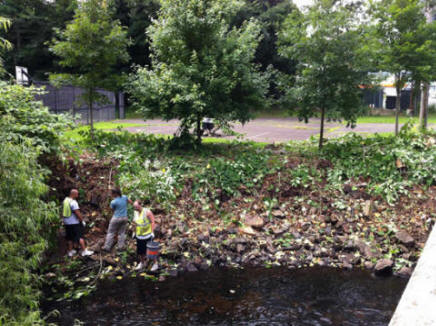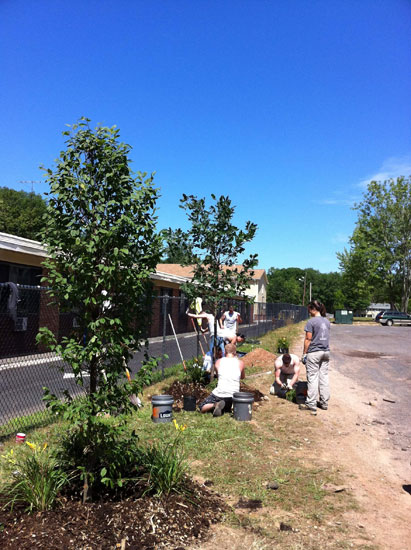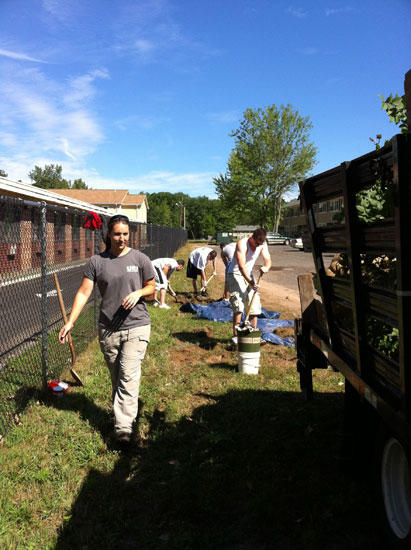Class News
Class of '64 supports URI with summer internships
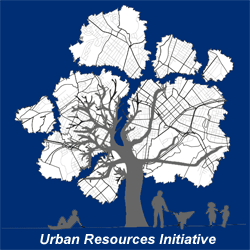
Our class is supporting the Urban Resources Initiative (URI), based at the Yale School of Forestry and Environmental Services, with funding to enable summer internships for URI initiatives. The following items (in reverse chronological order) describe this work.
- Presentation by Amy Zvonar, URI summer intern, to Yale '64 Class Council on February 4, 2012
- Correspondence and photos from Amy Zvonar, URI summer intern, August 31, 2011
- A New York Times blog (below), August 2, 2011
- A New Haven Register editorial (below), February 14, 2011
- A PowerPoint presentation given by a URI intern to our Class Council on February 5, 2011
A Greener New Haven has 1,000 more trees
New Haven Register, February 14, 2011
Working with the city, Urban Resources Initiative, a nonprofit
organization affiliated with Yale University School of Forestry and
Environmental Studies, has planted 1,000 trees in the last year.
The trees are part of a goal to plant 10,000 in the next five years, half by
URI and New Haven, half by individuals, businesses and institutions. If the
goal is met, the city should have more than 40,000 trees in its parks and on
its streets.
Trees are more than things of beauty. They provide shade and cooling,
control storm water and clean the air by removing pollutants and carbon
dioxide.
The tree-planting initiative is the truly green part of the city's
environmental efforts. It got an added impetus from a survey that found some
sections of the city had relatively few trees, and the realization that more
trees were being cut down than planted.
Most of the trees URI has planted have been in the strip of land between the
curb and sidewalk. Anyone can request a tree. In return, they must agree to
care for it.
The URI program got into full swing last fall, when 500 trees were planted.
The program is not just about trees. For its planters, URI hires and trains
high school students, who learn about ecology and tree care, ex-convicts and
recovering drug addicts who pick up basic job skills while earning a living.
The URI program is about people as well as trees. In more than one way, it
is helping to improve the quality of life and environment in New Haven.
Prisons, Then Parks: A Therapeutic Journey
New York Times, August 2, 2011
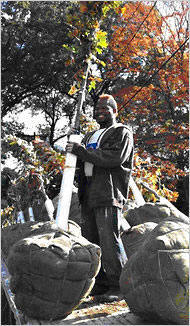
This
spring, James Sweat planted saplings on a grassy shoulder of Jewell
Street in New Haven — English oak, scarlet oak, northern red oak and
pink spire crabapple. Wearing a white T-shirt, black jeans and thin wire
glasses, he paused to smoke a cigarette and sip a beer. "If you saw me
on the street, you know, you wouldn't think I'm a criminal," he said.
With four other former prison inmates, Mr. Sweat, 23, was working for
the Urban Resources Initiative, a New Haven nonprofit affiliated with
Yale University that marries the goal of reintegrating prisoners into
society with urban forestry through its GreenSkills program. The crew of
five men planted about a dozen trees a day in New Haven, nudging the
city closer to its goal of planting 10,000 new trees by 2014.
To some, the sight of toughened and tattooed men from prison pruning
trees, tipping water cans and gently tamping soil may seem a bit
incongruous. But Urban Resources Initiative and a growing group of
organizations across the country are testing the premise that such
efforts can restore urban ecosystems and give inmates a sense of
stability and purpose.
The programs are proving all the more pragmatic, advocates say, as
cities and states contend with steep budget deficits and prison systems
struggle with populations that are far beyond capacity. Last year the
national prison population shrank for the first time in 39 years as
officials, seeking in some cases to reduce overcrowding, released more
than 600,000 inmates.
With the unemployment rate above 9 percent, these former inmates are at
a greater disadvantage than most in seeking work. "The question is, what
are we going to do with all of these people?" said Colleen
Murphy-Dunning, the director of Urban Resources Initiative. "What are
they going to do with themselves?"
Ex-convicts have an average unemployment rate of 50 percent. James Jiler,
former director of a two-acre garden and farm at the Rikers Island jail
complex in New York City, says that this remains a central challenge for
parolees. "Idle hands are the devil's playground," he said. "If these
men and women don't have steady work, they may find ways to occupy
themselves that are not so productive."
Recidivism rates top 60 percent in some states. Yet studies of employed
ex-convicts have found that their recidivism rate is less than half that
of all released prisoners.
Advocates like Ms. Murphy-Dunning and Mr. Jiler say that the work does
far more than simply occupy a worker's time and pay a salary, however.
"There is something integral about our connection with nature," Mr.
Jiler said. Gardening, he said, "offers the peace and tranquility
necessary for these folks to get beyond other issues in their lives."
Horticultural therapy is quite literally ancient history: centuries ago,
Chinese Taoists lauded the benefits of gardens and greenhouses. In the
1699 edition of "The English Gardener," the writer Leonard Meager
declared that "there is no better way to preserve your health" than
spend time in a garden.
In 1984 the Harvard entomologist E.O. Wilson coined the term biophilia
to describe the innate human "tendency to focus on life and lifelike
processes" and to bond with the natural world. "Our existence depends on
this propensity," Dr. Wilson wrote. "Our spirit is woven from it, hope
rises on its currents."
After years of working in factories, James Cunningham served five years
in prison. At age 34, he returned to Newark and began a six-month
internship with the New Jersey Tree Foundation, where he is now employed
full-time. He cares for thousands of trees, helps maintain a nursery and
leads two planting crews of parolees in the spring and autumn. "Now I
love getting up and going to work," he said. "This job gives me an
overall respect for life."
On days off, Mr. Cunningham occasionally drives through town with his
daughter as if through an art gallery, pointing to and naming the trees
that he has planted. "I'm proud of that," he said.
In an era of shrinking budgets, such programs can also prove less costly
for cities and states than hiring private contractors to plant and
maintain trees. It's "a lot less costly than the private sector," Ms.
Murphy-Dunning said of groups like hers.
Ben Falk, founder and director of Whole Systems Design, a sustainable
landscaping company in Vermont's Mad River Valley, says that such
programs are ultimately about "healing the land and the people
simultaneously." He is working with the Southeast State Correctional
Facility in Windsor, Vt., to redevelop 450 acres of state-owned land as
a working farm tended by inmates.
"In our prisons we're not rehabilitating prisoners effectively; on our
land we're not growing what we need to live anymore," Mr. Falk said. "We
need to move toward a solution that works synergistically with these
problems."
Messages from Amy Zvonar, 1964 Summer Intern for Urban Resources Initiative (August 31, 2011)
Dear Mr. Lavely and the Members of the Class of 1964:
I want to express my gratitude for your support of my internship with
the URI Greenspace program this summer. The internship experience is a
valuable component of my work towards a Master's degree in Environmental
Management. My decision to pursue this degree was motivated by my
experience as an environmental educator. Teaching adults and children
about environmental issues cultivated my desire to learn how to more
effectively connect people to each other and their environment. The work
I am doing in the communities of New Haven through the URI Greenspace
internship is helping me gain the practical skills and knowledge I need
to achieve this goal.
I am excited to have the opportunity to learn about the New Haven
community and environment through this internship experience. It would
be a pleasure to meet with you at your convenience to talk about my work
with URI. You can contact me through email or cell phone(678-315-0836).
I look forward to meeting you!
Sincerely,
Amy Zvonar
Master of Environmental Management, 2012
Yale School of Forestry and Environmental Studies
amy.zvonar@yale.edu
Hi Tony,
Thank you for the information regarding the Class Council meeting in
early February. I look forward to it. I am attaching a few pictures that
I have of me working with my Crossroads crew this summer. Please feel
free to post them on your class website.
For a little background, Crossroads is a residential rehabilitation
facility for men and women battling addictions. The guys who worked with
me this summer came out on a volunteer basis because they wanted to be
involved in environmental restoration work and community service. In one
picture, they are working on a stream restoration project. The group is
removing invasive Japanese knotweed in an effort to allow native plants
to grow along the bank. A second project they tackled was the planting
of 3 trees (2 European Hornbeams and 1 Chestnut Oak) at a public housing
site. The trees were requested by residents who wanted a shaded area and
something nicer to look at than a chain link fence.
During the planting we had two residents approach us full of excitement
and ready to water the trees with their grandchildren. The guys were
very proud to have made such a visible impact.
Enjoy and I look forward to meeting you.
Best, Amy
